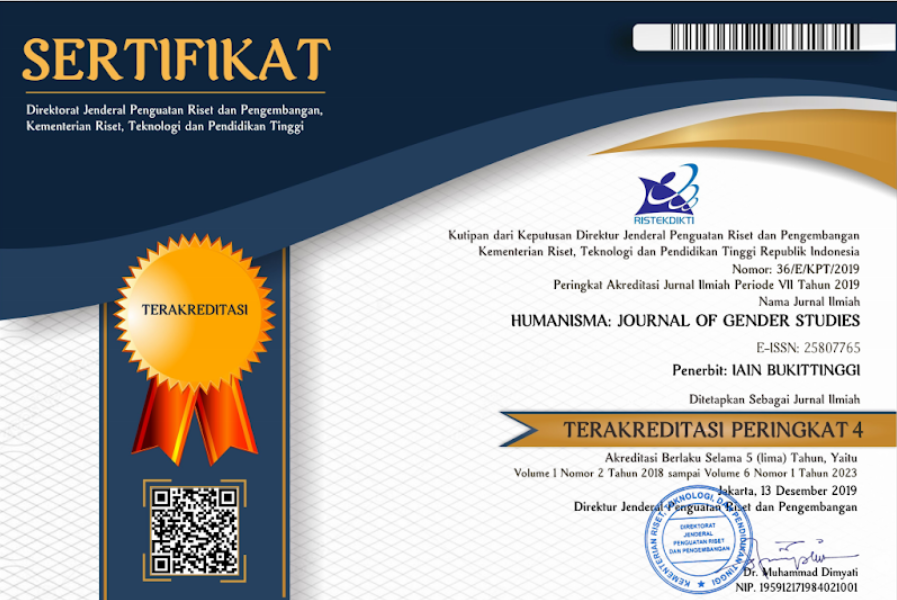Analysis of Variables of Gender, Religiosity, Emotional Intelligence and Allowances for Women's Decisions to Become Leaders
DOI:
https://doi.org/10.30983/humanisme.v6i2.5924Keywords:
Gender, Religiosity, Emotional Intelligence, Benefits, Women Leaders,Abstract
Some people think that men are the most perfect in terms of leadership. The fact states that in a religious environment, it iswrong for a woman to become a leader. However, at UIN Walisongo Semarang the number of female leaders is quite large. Women with emotional intelligence, the softer and more sensitive feelings they have, can also be one of the determining variables. Emotional intelligence is the ability to control oneself, have endurance when facing a problem, able to control impulses, motivate oneself, able to regulate moods, ability to empathize and build relationships with others. Another variable is about benefits. The existence of allowances is a good wind as additional income for the family's economy/finances. This research uses quantitative research methods. The variables of this study are variable X including: gender, religiosity, emotional intelligence, and benefits, variable Y namely: women's decision to become leaders. The subjects of this study were 45 female respondents, the respondents came from university level administrators, faculty and institutional levels. The data analysis technique uses descriptive analysis and multiple regression analysis. The results of the study stated that there was a significant influence on the variables of gender, religiosity and emotional intelligence on women's decisions to become leaders. Meanwhile, there is no significant influence on the allowance variable on women's decisions to become leaders. In the gender variable, there is an ideological influence of gender roles on providing support to prospective female leaders in student organizations and there are ideological differences in the gender roles of female voters who choose female and male leaders. In the religiosity variable, leaders who have a transformative style who continue to motivate their employees and are supported by a high level of religiosity, the campus will develop and be able to compete well. In the emotional intelligence variable, one of the important factors that influence a woman to become a leader. Women have more empathy and can build better relationships. On the benefits variable, that benefits affect employee performance, but does not affect the decision making of a woman to become a leader.
Â
References
Journal
Artaria, Myrtati D., ‘Perbedaan Antara Laki-Laki Dan Perempuan: Penelitian Antropometris Pada Anak-Anak Umur 6-19 Tahun’, Jurnal Masyarakat Kebudayaan Dan Politik, 22.4 (2009), 343–49
Bormann, Nilsâ€Christian, Larsâ€Erik Cederman, Scott Gates, Benjamin A. T. Graham, Simon Hug, Kaare W. Strøm, and others, ‘Power Sharing: Institutions, Behavior, and Peace’, American Journal of Political Science, 63.1 (2019), 84–100 <https://doi.org/10.1111/ajps.12407>
Boudreau, Cheryl, Christopher S. Elmendorf, and Scott A. MacKenzie, ‘Racial or Spatial Voting? The Effects of Candidate Ethnicity and Ethnic Group Endorsements in Local Elections’, American Journal of Political Science, 63.1 (2019), 5–20 <https://doi.org/10.1111/ajps.12401>
Clayton, Amanda, Diana Z. O’Brien, and Jennifer M. Piscopo, ‘All Male Panels? Representation and Democratic Legitimacy’, American Journal of Political Science, 63.1 (2019), 113–29 <https://doi.org/10.1111/ajps.12391>
Ditonto, Tessa, and Kyle Mattes, ‘Differences in Appearance-Based Trait Inferences for Male and Female Political Candidates’, Journal of Women, Politics and Policy, 39.4 (2018), 430–50 <https://doi.org/10.1080/1554477X.2018.1506206>
Dynes, Adam M., Hans J. G. Hassell, and Matthew R. Miles, ‘The Personality of the Politically Ambitious’, Political Behavior, 41.2 (2019), 309–36 <https://doi.org/10.1007/s11109-018-9452-x>
Ekstrom, Pierce D., Brianna A. Smith, Allison L. Williams, and Hannah Kim, ‘Social Network Disagreement and Reasoned Candidate Preferences’, American Politics Research, 2019, 1–23 <https://doi.org/10.1177/1532673X19858343>
Goleman, Emotional Intelligence (Terjemahan) (Jakarta: PT Gramedia Pustaka Utama, 2009)
Goodnow, Regina, Raúl L. Madrid, and Robert G. Moser, ‘Ethnicity, Institutions, and Female Representation’, Journal of Women, Politics & Policy, 40.3 (2019), 345–66 <https://doi.org/10.1080/1554477X.2019.1587383>
Holmes, Mary, Gender and Everyday Life, Gender and Everyday Life (Routledge, 2008) <https://doi.org/10.4324/9780203929384>
Imawati, Rochimah, and Radhitya Bustan, ‘Pengaruh Ideologi Peran Jender Terhadap Pemberian Dukungan Kepada Calon Pemimpin Perempuan Pada Organisasi Kemahasiswaan’, Jurnal Al-Azhar Indonesia Seri Humaniora, 1.2 (2011)
Jalaluddin, Psikologi Agama (Jakarta: PT Raja Grafika Persada, 2005)
Karim, Sukri, ‘Hubungan Gaya Kepemimpinan Transformasional Dan Religiusitas Dengan Kinerja Karyawan’, PsikoIslamedia Jurnal Psikologi, 2.2 (2017)
Klar, Samara, ‘When Common Identities Decrease Trust: An Experimental Study of Partisan Women’, American Journal of Political Science, 62.3 (2018), 610–22 <https://doi.org/10.1111/ajps.12366>
Maliki, Zainuddin, Bias Gender Dalam Pendidikan Sosiologi Pendidikan (Jakarta: Sinar Grafika, 2006)
Maruli, Sahat, ‘Pengaruh Tunjangan Penghasilan Terhadap Kinerja Pegawai Sekretariat Dewan Perwakilan Rakyat Daerah’, Universitas Sumatera Utara Medan, 2011
Mustafa, Erna, ‘Pengaruh Kecerdasan Intelektual Dan Kecerdasan Emosional Berdasarkan Gender Terhadap Tingkat Pemahaman Akuntansi’, UIN Alaudin Makasar, 2014
Najoan, Jecqueline Fritzie, Lyndon R.J. Pangemanan, and Ellen G. Tangkere, ‘Pengaruh Tunjangan Kinerja Terhadap Kinerja Pegawai Pada Dinas Pertanian Kabupaten Minahasa’, Jurnal Agri-Sosio Ekonomi, 14.1 (2018), 11–24
Oktarina, Soraya, and Heru Permana Putra, ‘Rohana Kuddus: Gender Dan Gerakan Sosial-Politik’, Journal of Feminism and Gender Studies, 1.2 (2021), 59 <https://doi.org/10.19184/jfgs.v1i2.25515>
Putra, Heru Permana, ‘Perbandingan Strategi Politik Calon Aanggota Legislatif Perempuan Dalam Pemilu Legislatif 2009 Di Kota Padang’ (Universitas Andalas, 2011) <http://repository.unand.ac.id/15058/>
Setiawan, Ichsan, ‘Komunikasi Dan Pemikiran Hukum Islam’, Jurnal Darussalam;Jurnal Pendidikan, VIII.2 (2017), 236–47
Syamsi, Ibnu, Pengambilan Keputusan Dan Sistem Informasi (Jakarta: Bumi Aksara, 2000)
Verge, Tà nia, and Raquel Pastor, ‘Women’s Political Firsts and Symbolic Representation’, Journal of Women, Politics & Policy, 39.1 (2018), 26–50 <https://doi.org/10.1080/1554477X.2016.1268878>
Yulianti, Reny, ‘Women Leadership: Telaah Kapasitas Perempuan Sebagai Pemimpin’, MADANI Jurnal Politik Dan Sosial Kemasyarakatan, 10.2 (2018)
Books
Goleman, Emotional Intelligence (Terjemahan) (Jakarta: PT Gramedia Pustaka Utama, 2009)
Jalaluddin, Psikologi Agama (Jakarta: PT Raja Grafika Persada, 2005)
Maliki, Zainuddin, Bias Gender Dalam Pendidikan Sosiologi Pendidikan (Jakarta: Sinar Grafika, 2006)
Syamsi, Ibnu, Pengambilan Keputusan Dan Sistem Informasi (Jakarta: Bumi Aksara, 2000)
others
Maruli, Sahat, ‘Pengaruh Tunjangan Penghasilan Terhadap Kinerja Pegawai Sekretariat Dewan Perwakilan Rakyat Daerah’, Universitas Sumatera Utara Medan, 2011
Mustafa, Erna, ‘Pengaruh Kecerdasan Intelektual Dan Kecerdasan Emosional Berdasarkan Gender Terhadap Tingkat Pemahaman Akuntansi’, UIN Alaudin Makasar, 2014
Downloads
Submitted
Accepted
Published
Issue
Section
License
Authors who publish with this journal agree to the following terms:
- Authors retain copyright and grant the journal right of first publication with the work simultaneously licensed under a Creative Commons Attribution-ShareAlike 4.0. that allows others to share the work with an acknowledgment of the work's authorship and initial publication in this journal.
- Authors are able to enter into separate, additional contractual arrangements for the non-exclusive distribution of the journal's published version of the work (e.g., post it to an institutional repository or publish it in a book), with an acknowledgment of its initial publication in this journal.
- Authors are permitted and encouraged to post their work online (e.g., in institutional repositories or on their website) prior to and during the submission process, as it can lead to productive exchanges, as well as earlier and greater citation of published work (See The Effect of Open Access).



















